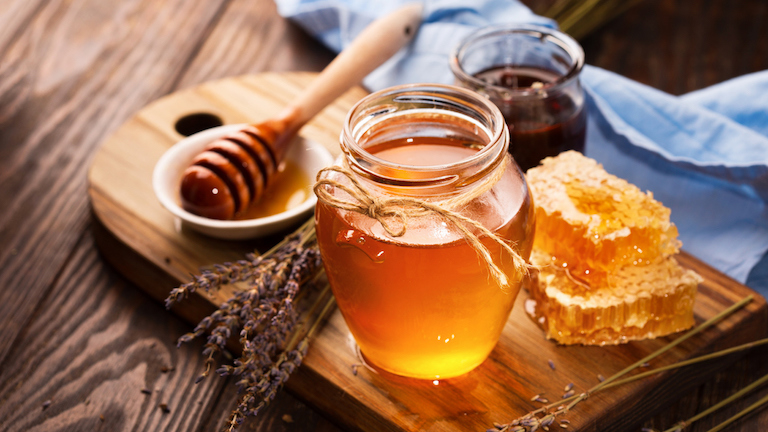There may be some truth to the old wives’ tale about honey’s antiseptic and medicinal properties, new expert reports reveal
Doctors should recommend honey and over-the-counter remedies as first-line treatment for a cough, not antibiotics, according to a new draft guidance from the National Institute for Health and Care Excellence (NICE) and Public Health England (PHE).
Generally speaking, acute coughs are the result of a cold, flu virus or bronchitis, and usually last around three weeks.
‘If someone has a runny nose, sore throat and cough we would expect the cough to settle over 2-3 weeks and antibiotics are not needed,’ says Dr Tessa Lewis, GP and chair of the NICE antimicrobial prescribing guideline group.
‘People can check their symptoms on NHS choices or NHS Direct Wales or ask their pharmacist for advice.’
Dr Lewis states that if the cough symptoms continue to worsen and the person feels unwell or breathless, only then should they contact their GP.
However, doctors should promote self-care actions first, she recommends.
‘Antibiotic resistance is a huge problem and we need to take action to reduce antibiotic use,’ says Dr Susan Hopkins, healthcare-associated infection and antimicrobial resistance deputy director at PHE.
‘Taking antibiotics when you don’t need them puts you and your family at risk of developing infections which in turn cannot be easily treated.’
But what kind of honey is best for treating a cough and how much should we take? We consulted Healthista’s Nutritional Director Rick Hay for his expert advice.
How to choose the right honey
‘Honey has both anti-bacterial and anti-viral properties,’ says Hay. ‘It is often used to help with wound healing too; for ulcers, burns and wounds, in particular. Honey contains a number of antioxidant flavanoids to boost immune function.’
Honey contains a number of antioxidant flavanoids to boost immune function
‘All honey has antibacterial properties. However if you want a top of the range product, I recommend taking manuka honey.
Manuka honey is produced by bees whose hives are placed near wild manuka bushes grown only in New Zealand’s north island.
‘Manuka honey is the most potent for anti-bacterial activity,’ Hay continues. ‘Its strength can be measured either by UMF (unique manuka factor), MGO (methylglyoxal measurement) or MGS, which measures the strength of the methylglyoxal (an antibacterial compound) and the purity of the honey.
A spoonful of manuka honey can be taken neat, with warm water or lemon juice
From there, the higher the UMF the higher the non-peroxide anti-bacterial activity – and the higher the price.
‘Manuka honey fights bacteria and viruses while also boosting the immune system,’ says Hay. ‘It’s soothing, and a teaspoonful can be taken neat, with warm water or lemon juice. Avoid boiling the water.’
If you prefer to take manuka honey in capsule form, try Lifeplan Honey C £7.99 at Healthista shop.
Since prices of manuka honey can be quite steep, Hay also recommends taking organic or raw honey instead, for its purity. ‘Avoid commercial varieties of honey as they tend to be over-processed and overheated.’ Try Raw Organic Pure Blossom Honey £5.69 from Healthista shop.
Related Healthista Content
FOOD Warning over fake Manuka honey
Meat-free Monday recipe: Vegan chocolate mousse with banana, avocado and honey
41 natural cold and flu remedies these health experts swear by
Like this article? Sign up to our newsletter to get more articles like this delivered straight to your inbox.






















































